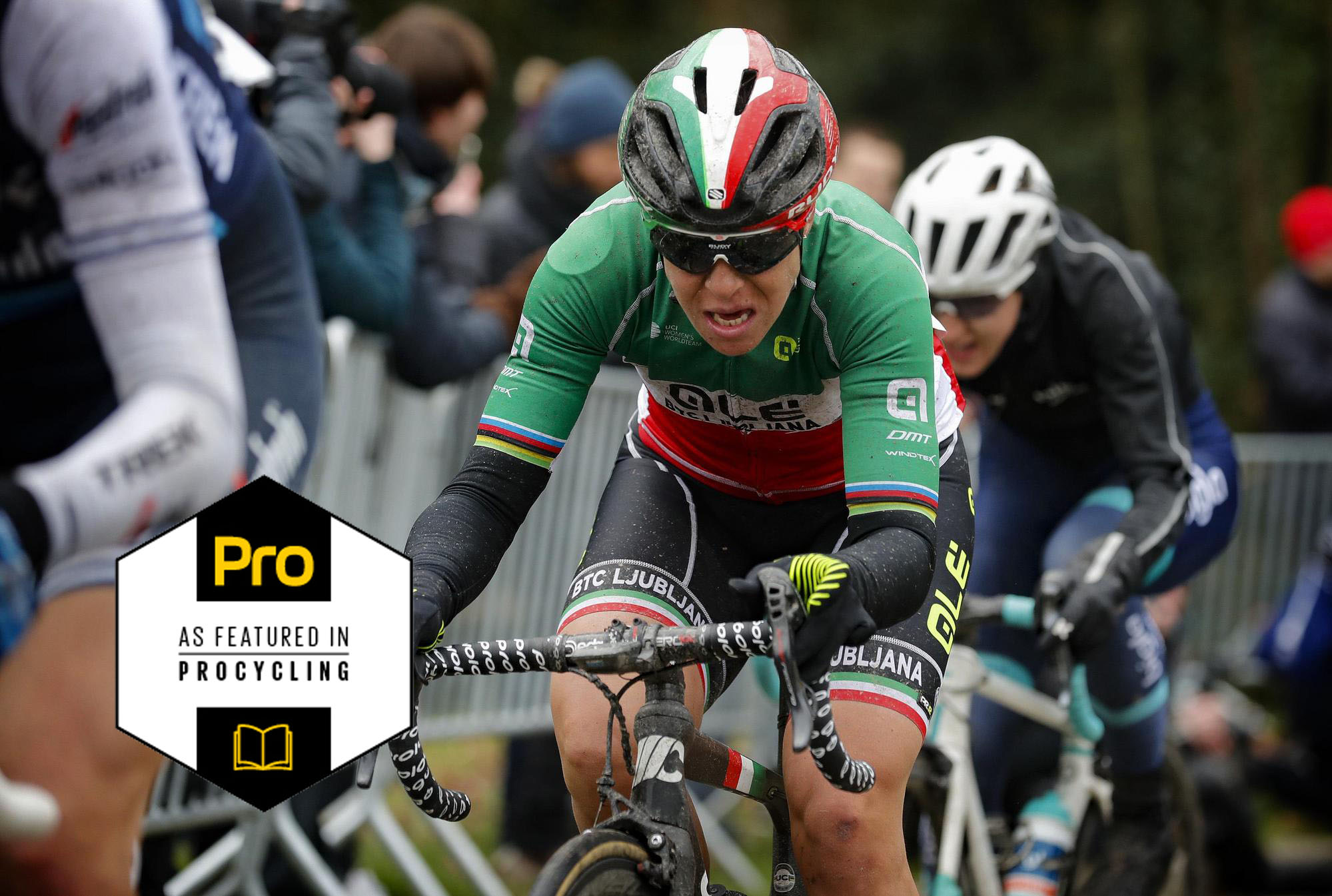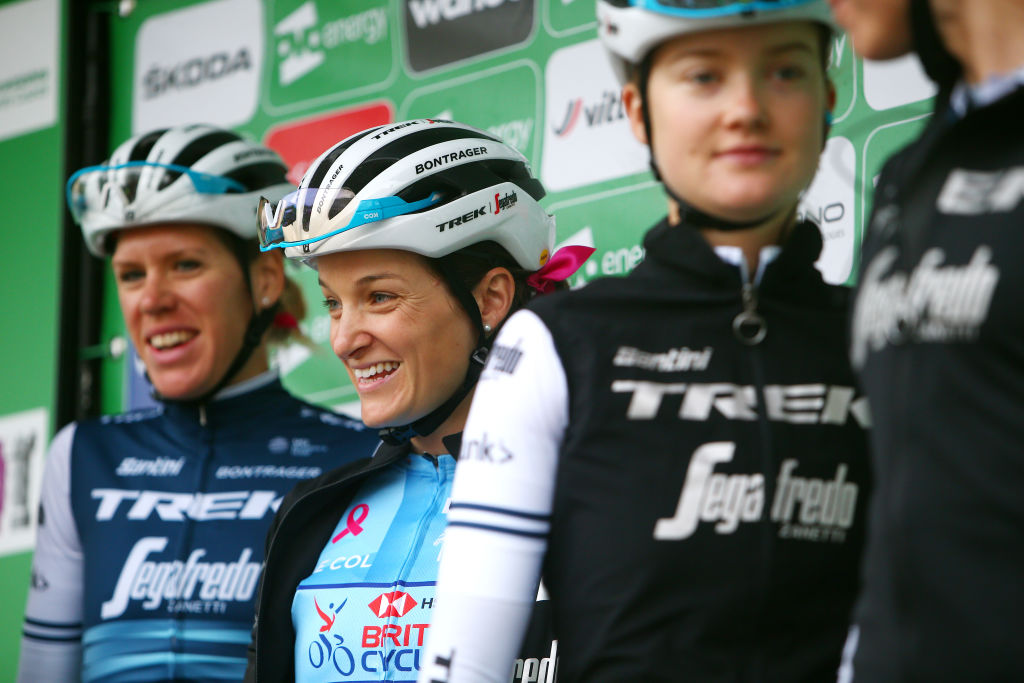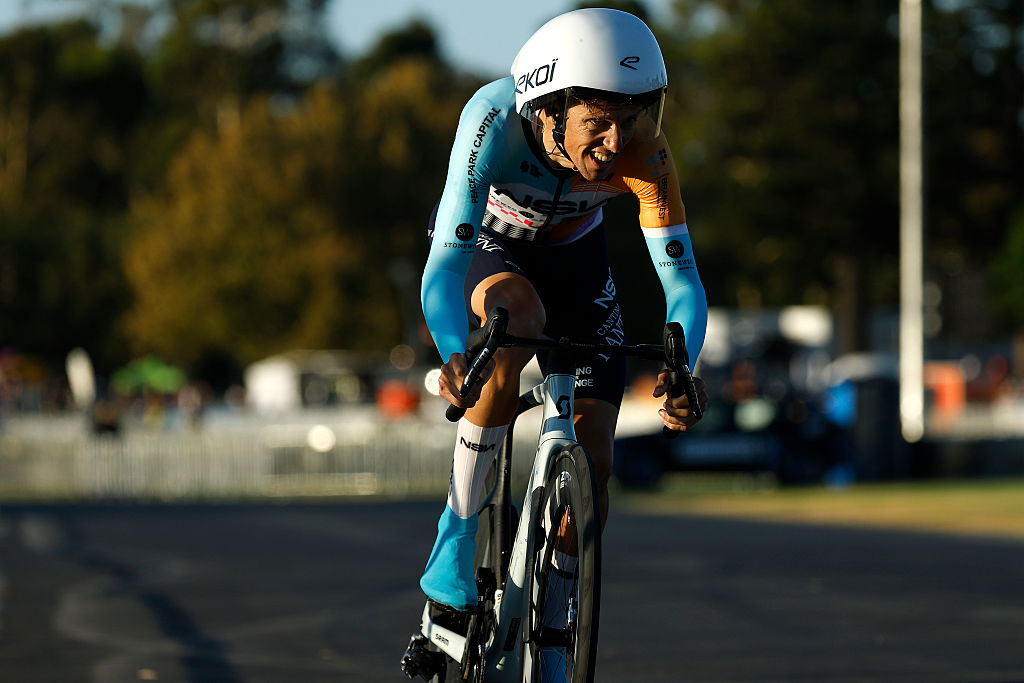Mother courage: Exploring motherhood at cycling's elite level
Procycling finds out why juggling racing and motherhood is rare, and how the sport can make it easier

The latest race content, interviews, features, reviews and expert buying guides, direct to your inbox!
You are now subscribed
Your newsletter sign-up was successful
Procycling magazine: the best writing and photography from inside the world's toughest sport. Pick up your copy now in all good newsagents and supermarkets, or get a Procycling subscription.
Marta Bastianelli and Lizzie Deignan are two of the very few top pros who are mums, too. Procycling finds out why juggling racing and motherhood is rare, and how the sport can make it easier.
This article first featured in Procycling magazine issue 252, in February 2019
On a cloudy Sunday morning in Glasgow last August, Marta Bastianelli joined an elite club when she beat Marianne Vos to take the European road race title. The club she joined was not the list of championship winners but one that had been created only two days earlier when Laura Kenny won gold in the team pursuit. Kenny, and now Bastianelli, were the first in their respective disciplines to win European titles as mothers.
A fair question might be: what has that got to do with anything? Men do it all the time as fathers and nothing is made of it. Chris Froome has two children and he has managed to win four Tours de France, a Giro d'Italia and a Vuelta a España. True, but it is still a notable event when a female rider returns to the top after childbirth.
Bastianelli and Kenny's success, along with that of the likes of Serena Williams and Jessica Ennis-Hill in tennis and athletics, is proof that female athletes can come back just as good as – if not stronger than – before giving birth. But it also points to a wonky system in cycling, and sport in general, that makes motherhood a difficult prospect for female professional athletes.
Swedish rider Emma Johansson retired at the end of 2016, citing the desire to have a family as one of the primary reasons behind the decision. She announced that she was pregnant with her first child just a year after she officially hung up her wheels at the age of 33. Johansson's path is the one most commonly taken by female cyclists. Issues such as financial constraints, poor structures, bad contracts and a number of other factors all contribute to making it harder to juggle motherhood with a professional career in the peloton.
The latest race content, interviews, features, reviews and expert buying guides, direct to your inbox!
Bastianelli, who won the Worlds road race in 2007, is one of just a few who have taken a break from the sport and come back after having a child. She was one of the fortunate few to find an understanding team on her return, combined with the support of the Fiamme Azzurre – the sporting arm of Italy's Penitentiary Police, which, incidentally, riders Elena Cecchini and Simona Frapporti are also part of – and her family.
"It has never been easy to combine the life of being a mother and a wife while also competing at this level, but no one has ever made me think that it would be better to go and do another job," Bastianelli tells Procycling.
"Indeed, if I am here today, it's thanks to my family and my military group, who have always supported me. For me, every victory in a race is a victory for my family. All of the sacrifices that I make, they do it with me," she says.
Bastianelli's maternity leave came at a time of flux for the Italian rider. In the build-up to the defence of her world title at the end of 2008, the then 21-year-old tested positive for the appetite suppressant fenfluramine. Bastianelli claimed that she had not taken it for performance-enhancing purposes, but she was eventually banned. After sitting on the sidelines for two years, she returned to racing midway through the 2010 season and rode a full campaign the following year. However, she struggled to pick up where she had left off, and by the start of 2013, Bastianelli was considering hanging up her wheels, aged just 26. In the end, a chat with Marcello Tolu, the head of the Fiamme Azzurre, persuaded her to carry on.
Things did eventually begin to look up for Bastianelli, who took her first victory since her return at the 2013 Tour Languedoc Roussillon. But she would call time on her season just two months later, following the Giro Rosa.
Bastianelli's pregnancy was a difficult one and it prevented her from doing much, if any, training at all. She gave birth to her daughter, Clarissa, in May 2014 before returning to make her first competitive appearance at the Italian Track Championships that September. The following January, at the start of 2015, she was back racing on the road with Aromitalia-Vaiano. Although she was racing pretty quickly post-pregnancy, Bastianelli had to get used to juggling her new life off the bike, as well as the recovery needed to perform on it.
"After a pregnancy and with a small child, it's never easy to ride a bike. Pregnancy changes you as an athlete and it's difficult to be like you were before," she explains. "Finding the desire to return to winning was my biggest challenge. Luckily, I immediately found a team and a quiet environment where I was able to manage my season calmly."
At the time, Bastianelli was the only professional road racer that is a mother. She will have some additional company in the peloton this year with Lizzie Deignan set to return to racing in June after giving birth to her first child last September. Deignan has enjoyed the support of her new Trek-Segafredo team in her plans to come back to racing, and, thanks to several sponsorship deals, had the financial capability to take a year out; she last raced in 2017. When her move to Trek was announced, Deignan said that one of the reasons she chose to transfer to the team was because "rather than see me as a risk in pregnancy, they saw me as a valued athlete".
Three-time Olympic time trial champion Kristin Armstrong is another road rider to have taken a break in her career to have children. The now 45-year-old retired in 2009 after winning her first Olympic title the year before. Two years after having her first child, she won gold again in London in 2012, and went on to take victory in Rio four years later.
Changing attitudes
But to find more top-level riders who are also mothers, you have to look to other disciplines. On the track, you have Laura Kenny and Sarah Storey, and in mountain biking you have multiple cross-country world champion Gunn-Rita Dahle Flesjå. In cyclo-cross there is Loes Sels, Denise Betsema and Kim Van de Steene.
Sels, a former two-time Belgian champion and cousin of world champion Sanne Cant, found herself in the middle of a furore at the start of 2017 when the Belgian national selector, Rudy De Bie, referred to her as a "hobby crosser".
In the build-up to that year's World Championships in Luxembourg, De Bie had been musing out loud in an interview with Belgian newspaper Het Nieuwsblad about whether he needed to fill all five of the spots available in the women's squad.

"Do I take Loes Sels, mother of two and 'hobby crosser'? Is it up to the federation to sponsor her hobby?" he said.
The backlash saw him make a public apology, and Sels was added to the Belgian team. Yet his quip represents an issue faced by many women: that being a mother means they are no longer taken seriously at their job. However, the response to his comments shows that this is a point of view increasingly at odds with societal norms.
Like Sels, Betsema is also a mother of two, but her path is a different one to most in the small group of racing mothers. The Dutch rider had her children prior to turning pro, allowing her more freedom. Following the birth of her second child, Betsema took a further two years off from racing, and it would be four years in total before she started competing again.
Betsema initially competed in mountain-bike races before switching to cyclo-cross for the 2018-2019 season. She signed a semi-pro contract, but quickly made her mark by winning the fifth round of the World Cup in Koksijde and taking bronze at the European Championships. Her performances have earned her a full-time professional contract with Marlux-Bingoal. With her career taking off, Betsema couldn't imagine halting it for maternity leave*.
"I know how it was for me to do it at the beginning of my career. I think it is a bit harder when you do it in the middle of your career because you really have to plan it," Betsema tells Procycling. "I ride with some girls who say, 'Now I have to quit because I also want kids and I'm near the end of my 30s,' so it's really a big thing. I had always planned to be a professional, but then the kids came so we decided to have a break and be a mum and dad. We also decided that two kids would be perfect, and then I could focus on my career.
"The most difficult part is that you are pregnant for nine months, and then afterwards you have to be healthy to start training again. It's a really long time for your break. When you're a man, it's no problem. Of course, you sleep a bit less, but the rest is OK."
Becoming a successful cyclist takes focus and a certain amount of selfishness, and whether a rider is male or female, there is a tricky balance to find when you are a parent and a professional rider. Support and understanding from the team are necessary, as well as from the rider's family. Perhaps by having her children before her career took off, Betsema had a bit of a head start in negotiating those challenges, but support and planning are still key.
"When I came to the team, they knew that I am also a mum and I can't do all of the special team days because I also need to be at home. They know it and they accept it. They also think that it is a very nice thing to do, too – to be a mum and a pro cyclist," Betsema says.
"You always have to plan when you go training, when you go racing, so that's another thing. When you are a father and you race, you have the same thing – you also have to plan. For me, my husband does a lot at home. When I have my race season, which is from September to February or March, then he does a lot more at home."
Maternity clause introduced
While Betsema and her cyclo-cross colleagues will not feel the benefit yet, there are changes afoot surrounding maternity leave for road riders. In the past, some contracts stipulated that if a rider were to become pregnant, then the contract would be terminated. Although this is not enforceable in most countries, a power imbalance between managers and riders, and a lack of knowledge of rights, meant that this would often go unchallenged. After lobbying by groups such as the women's rider association, The Cyclists' Alliance, it was announced in November that a maternity clause would be introduced in 2020.
The new regulations say that a rider is entitled to three months of full pay and a further five months at 50 per cent pay, although the amount paid must not be lower than the minimum salary of €15,000. These regulations will only apply to teams who sign up to the new Women's WorldTour system. The entitlement will also cease at the end of the pregnancy. Of course, riders are also entitled to state-mandated maternity benefits, but this varies wildly from country to country.
"I think as British women, in terms of maternity, we lead the way compared to some stories that I've heard from Americans, who only get five weeks of maternity leave. I think that in the UK we have it very good," Deignan told Cyclingnews recently when she met up with her new team at their first training camp in Sicily in December.

Nevertheless, maternity rights are moving forward. Rightly or wrongly, Deignan's return to action this year will be keenly watched, and if her comeback is successful then it could prove another push forward for the governing body. Even with increased support, taking a large chunk of time out of a career is a difficult decision, particularly for a rider like Deignan, who is in her pomp. However, those that do decide to do it will enjoy a bit more security.
Perhaps a few years down the line, riders taking maternity leave won't be such a novelty, and more mums will rise to the top step of the podium. And with the UCI Road World Championships happening in Deignan's home of Yorkshire this year, will that elite club of championships winners who are also mothers have another member?
*In April 2019, after the publication in Procycling of this article, it was announced that Denise Betsema had tested positive for an anabolic androgenic steroid at the Hoogerheide round of the cyclo-cross World Cup in January 2019 and at the Middelkerke round of the Superprestige series the following month.
While B samples confirmed the positive tests, Betsema claimed that she had tested positive as a result of contaminated supplements, and she served a six-month ban between April and October 2019 before re-joining her team – Pauwels Sauzen-Bingoal – for the 2019/20 cyclo-cross season, and was racing again as of January 2020.
Procycling magazine: the best writing and photography from inside the world's toughest sport. Pick up your copy now in all good newsagents and supermarkets, or get a Procycling print or digital subscription, and never miss an issue.
Follow @Procycling_mag on Twitter.
Born in Ireland to a cycling family and later moved to the Isle of Man, so there was no surprise when I got into the sport. Studied sports journalism at university before going on to do a Masters in sports broadcast. After university I spent three months interning at Eurosport, where I covered the Tour de France. In 2012 I started at Procycling Magazine, before becoming the deputy editor of Procycling Week. I then joined Cyclingnews, in December 2013.
